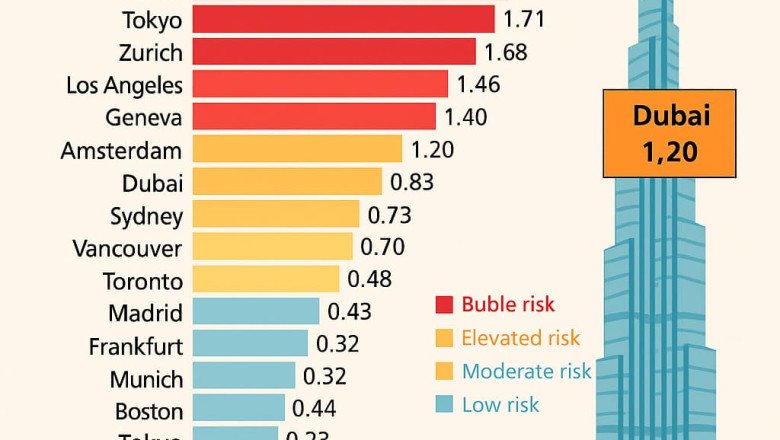
views
Every year, the UBS Global Bubble Index attracts worldwide attention. This benchmark measures the risk of property price bubbles in 21 major cities, signaling where valuations may be stretched and where corrections could occur. For investors, developers, and policymakers, the index has become an essential tool for understanding urban housing dynamics.
The 2025 edition of the Global Bubble Index highlights an evolving landscape in international real estate, with Miami, Tokyo, and Zurich topping the high-risk list. Cities like Geneva, Amsterdam, and Los Angeles also remain in the “elevated risk” category. Interestingly, Dubai has moved further up the ranking, now standing out as one of the markets to watch.
This article explores what the Global Bubble Index is, what it reveals about global housing markets, and why Dubai’s position on the index is both a challenge and an opportunity for investors.
Understanding the Global Bubble Index
The Global Bubble Index evaluates bubble risks by analyzing metrics such as:
The results are consolidated into four categories: low risk, moderate risk, elevated risk, and bubble risk. Importantly, the index does not predict the timing of corrections; rather, it measures vulnerability to imbalances.
In recent years, as global interest rates rose, affordability pressures caused markets like Toronto, Vancouver, Frankfurt, and Paris to see price drops of up to 20% in real terms. In contrast, cities like Miami and Dubai surged ahead, posting nearly 50% real growth over the past five years.
Dubai in the Global Bubble Index
Dubai’s real estate market is now classified as in the “elevated risk” zone. At first glance, that may sound alarming. However, unlike some European cities where bubble conditions resulted from speculative excess, Dubai’s rise has been supported by a unique mix of structural and policy factors.
Why Dubai Stands Out
Demographic Growth
Dubai continues to attract a global workforce, entrepreneurs, and high-net-worth individuals. The city’s population surpassed 3.7 million in 2025 and is expected to keep growing, driving genuine housing demand.
Global Safe Haven
Amid geopolitical tensions and tax policy shifts in Europe and North America, Dubai has emerged as a preferred destination for capital preservation. Freehold property rights, a stable currency pegged to the US dollar, and investor-friendly laws enhance its appeal.
Luxury & Branded Residences Boom
From Palm Jumeirah to Dubai Islands, branded residences and waterfront developments are commanding premiums. International hotel chains and luxury brands have partnered with local developers, creating assets that combine lifestyle with investment.
Infrastructure & Mega Projects
Dubai’s continuous investment in infrastructure — airports, ports, and public transport — supports long-term value. Projects like Dubai 2040 Urban Master Plan focus on sustainable growth, reducing the speculative character of the market.
Golden Visa & Investor Incentives
Residency programs linked to property purchases above AED 2 million have spurred demand from investors looking for lifestyle security as well as returns.
Risks to Monitor
While Dubai’s fundamentals remain strong, the Global Bubble Index rightly cautions against unchecked exuberance. Risks include:
The Investment Case for Dubai
Despite the risks, Dubai remains one of the strongest performers in the Global Bubble Index when it comes to long-term potential. Unlike many cities at bubble risk, Dubai’s story is underpinned by real economic drivers rather than speculative overheating.
Global Bubble Index and Dubai’s Future
The Global Bubble Index 2025 shows that Dubai is not immune to bubble risks. Its rapid price appreciation, elevated risk rating, and ambitious construction pipeline highlight the need for caution. Yet, unlike some Western markets already in correction mode, Dubai’s fundamentals — demographic growth, lifestyle appeal, investor-friendly environment, and global positioning — suggest that its elevated risk may be a sign of strength rather than fragility.
For investors, the message is clear: Dubai requires selective strategies. Prime waterfront properties, branded residences, and projects tied to lifestyle infrastructure will likely outperform. Meanwhile, oversupplied areas may see slower appreciation.
In short, the Global Bubble Index signals vigilance, but for Dubai, it also underscores opportunity. The city remains one of the few markets globally where strong rental yields align with long-term growth potential — making it a standout destination in an era of housing market uncertainty.
* This article is provided courtesy of Sterling Capital Real Estate LLC, which regularly shares market observations and expert insights on the Insights page of its website.”
https://www.dubaichronicle.com/2025/09/29/global-bubble-index-2025-dubais-real-estate-prospects/






















Comments
0 comment